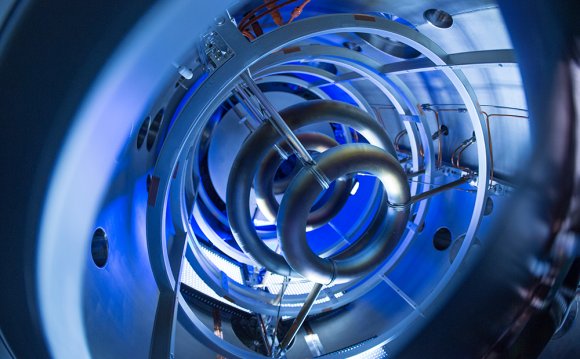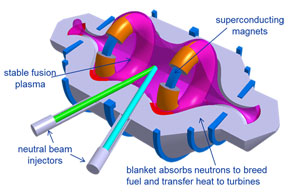
 NEWS ANALYSIS: Lockheed Martin's Skunk Works claims the ability to generate cheap energy from nuclear fusion with little waste or global warming is within its grasp.
NEWS ANALYSIS: Lockheed Martin's Skunk Works claims the ability to generate cheap energy from nuclear fusion with little waste or global warming is within its grasp.
Imagine a source of electrical power that uses water for fuel, produces byproducts that are totally safe and releases no air pollution. Then imagine that once it's up and running, it'll be so portable that an entire power plant could fit into the cargo hold of an airplane. Now, imagine that it'll be running in prototype form in five years and operating commercially in ten. It sounds like science fiction, but it's not. However, it is being built by a group of scientists and engineers in a place that's legendary for doing what was thought to be impossible in a remarkably short amount of time. This place, which is part of Lockheed Martin's aeronautics business, is popularly known as the Skunk Works. This is the same Skunk Works created by the near-mythical Kelly Johnson, an aerospace engineer able to head teams that built the SR-71 Blackbird reconnaissance jet years before any other organization even thought Mach-3 flight was possible. The Skunk Works, which was started during World War II, has created some of the most iconic aircraft ever built, ranging from the then-revolutionary P-38 fighter to the high-altitude U2 reconnaissance. Current projects include the Falcon HTV-2 hypersonic aircraft, which flies at a top speed of 13, 000 miles per hour, fast enough to take it from New York to Los Angeles in 12 minutes. The Skunk Works is able to create its ground-breaking technological advances through a combination of rapid prototyping, appropriate scalability, and a management environment that fosters innovation without traditional limits. One other feature of the Skunk Works is its practice of being very quiet about its work until it reaches a point at which the group is certain that its project actually works. This is why the Skunk Works and its new Compact Fusion project have the potential to be so revolutionary—by succeeding where so many other efforts have fallen short after more than a half-century of research. Yes it's true that such claims have been made and debunked before. Many people remember when a pair of electrochemists, Martin Fleischmann and Stanly Pons claimed in 1989 that they had discovered "cold fusion, " a way to make hydrogen atoms fuse at room temperatures and pressures. The researchers' claims were soon rejected by other scientists who couldn't repeat the experimental results that Fleischmann and Pons reported. The U.S. government has funded fusion research projects for decades without producing the design of an economical fusion reactor. Unlike earlier fusion projects, this effort has the results of all that research behind it as well as the Skunk Works' physics and engineering know-how to create a working prototype. The Lockheed Martin project is designed to take advantage of the practice of rapid prototyping that the Skunk Works pioneered by building relatively small, easily improved incremental projects that lead to a finished product that actually works. Those relatively small projects also mean that each iteration is built quickly by relatively few people. Because it can be done quickly, the rapid development also means that choices can be less conservative; they can cost less and alternatives are easier to develop. This rapid progress provides a sort of developmental momentum that helps propel innovation. The Compact Fusion reactor makes use of a magnetic bottle created by superconducting magnets to contain the temperatures that can reach hundreds of millions of degrees. This magnetic bottle can then release some of the heat so that it can be used for power generation.
YOU MIGHT ALSO LIKE
Lockheed Martin announces 10 year plan to reach cold ...
Lockheed Martin - Compact Fusion - The off-topic forum
Lockheed Martin s first 6th gen fighter concept Miss ...

 NEWS ANALYSIS: Lockheed Martin's Skunk Works claims the ability to generate cheap energy from nuclear fusion with little waste or global warming is within its grasp.
NEWS ANALYSIS: Lockheed Martin's Skunk Works claims the ability to generate cheap energy from nuclear fusion with little waste or global warming is within its grasp.











